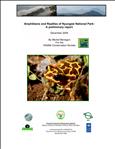
|
Amphibians and reptiles of Nyungwe National Park- A preliminary report
The present draft represents a preliminary report of a survey conducted in November 2008 aimed to produce an inventory of the herptofauna of Nyungwe Forest National Park. The specimens collected were not yet properly examined and most identifications were just carried out in the field with no specific literature or comparison material.
|
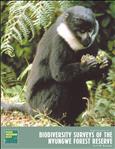
|
Biodiversity surveys of the Nyungwe Forest Reserve
In this report, three measures of conservation importance are used: a) species richness; b) species endemism and c) complementarity of sites within the forest. Each of these measures is quantified at each survey site, thereby allowing a comparison to be made between the relative importance of each site for each method. Three taxa were selected for study primarily based on the ease of identification using existing taxonomic keys. By choosing very different taxa (mammals, birds and trees), it was hoped that the analysis of all three taxa combined would allow these taxa to act as ‘umbrellas’ for the weighting of sites for other unsurveyed taxa.
|
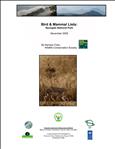
|
Bird & mammal lists- Nyungwe National Park
Species lists for birds and mammals were made for Nyungwe National Park in the early 1990s. However, there was a need to update the original species lists consolidating all existing information on birds and mammals. Long term monitoring of birds and mammals has been ongoing in the Park since 1996 and results from these studies need to be combined with the official Park species lists. In addition, a preliminary system of camera trapping was initiated in 2007 and continued in 2008 with the hope to target nocturnal and difficult to see animals as well as to confirm the ongoing presence of some species such as leopard and golden cat, within the Park.
|
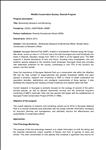
|
Factsheet WCS- Biodiversity research and monitoring
The overall objective of research and monitoring carried out by WCS in Nyungwe National Park is to provide protected area authorities with the quality scientific information necessary for long-term planning and management, and ultimately improve the effectiveness and sustainability of conservation efforts.
|
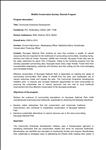
|
Factsheet WCS- Community entreprise development
Effective conservation of Nyungwe National Park is dependent on meeting the needs of surrounding communities, their ability to benefit from the park, and sustainable use of natural resources inside and outside the park. The Community Enterprise Development Initiative aims to improve and increase livelihood opportunities for local communities by ensuring the sustainable use of natural resources that are vital to local livelihood improvement and thus effective conservation of the Nyungwe landscape.
|
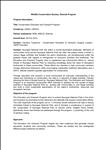
|
Factsheet WCS- Conservation education and outreach program
The Education and Outreach Program aims to protect Nyungwe National Park in the short- and long-term by promoting human behaviors and attitudes that support conservation efforts. The main objectives of the program are to: 1) Promote human behaviors that help to reduce immediate threats to Nyungwe National Park; and 2) Develop a constituency in support of the conservation of Nyungwe National Park to prevent and/or mitigate future threats. Specifically, three main threats are addressed through this program: 1) poaching; 2) fire; and 3) bamboo cutting.
|
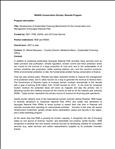
|
Factsheet WCS- Development of sustainable financing mechanisms for the Conservation and Management of Nyungwe National Park
In addition to protecting biodiversity Nyungwe National Park provides many services such as water provision and purification, climate regulation, erosion control and flood protection which are crucial for the survival of a large proportion of rural poor and to the sustainability of all primary industries (tea production, coffee washing stations, etc.) and the country’s economy. While environmental protection is vital, the fundamental problem facing conservation is finance.
|
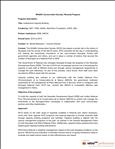
|
Factsheet WCS- Institutional capacity building
The Government of Rwanda now manages Nyungwe through the auspices of the Rwandan Development Board (RDB). The role of WCS has increasingly become one of developing the capacity of park staff at different levels and through various management programmes to manage the park effectively. As part of this process, many former WCS staff have been recruited by RDB to assist with this process.
|
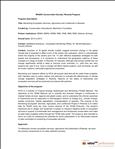
|
Factsheet WCS- Monitoring ecosystem services, agriculture and livelihoods in Rwanda
WCS is a member of Tropical Ecology Assessment and Monitoring (TEAM) Network. The objectives of the TEAM Network are to quantify and forecast changes in biodiversity in tropical forests at local, regional and global scales, and to understand the intrinsic dynamics of biodiversity and its responses to anthropogenic drivers of change (e.g., climate change, habitat conversion, habitat degradation, overexploitation of species).
|
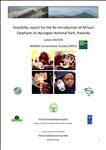
|
Feasibility report for the re-introduction of African elephants to Nyungwe National Park, Rwanda
This report has been carried-out as a first step towards assessing the feasibility of re-introducing the African elephant to Nyungwe National Park, Rwanda. This report brings together a large amount of information and expert opinion that needs to be considered when re-introducing elephants to Nyungwe NP. It is stressed that elephant translocations are costly undertakings running into hundreds of thousands of dollars and are dangerous exercises for both the animals and staff involved. The translocations will have strong socio-political implications and these will be felt most by rural communities living next to Nyungwe NP.
|